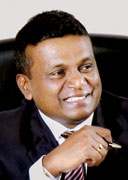Lanka has much potential in souvenir market
By Sanjeevi Jayasuriya
Sri Lanka is ready to cater to the anticipated influx of tourists and
sees huge potential in the gifts and souvenir market.

Anil Koswatte |
“Our country is ready to welcome the increased number of tourists
which is expected to drive rural economic growth substantially. In the
backdrop of the influx, we at Laksala will take steps to ensure
home-based craft and rush and reed industry development,” Laksala, the
premier state gift and souvenir boutique, Chairman, Anil Koswatte told
Sunday Observer Business.
The targeted number of tourist arrivals will be surpassed before the
time frame and related integrated services and products will also be
ready to receive the tourists. The capacity building projects and skills
development are in place where Laksala emphasis is on next generation
craftsmanship, he said. “Considering a similar situation in Malaysia,
Thailand and Vietnam where 22 million, 23 million and 12 million tourist
arrivals were recorded, Sri Lanka could benefit by tying up with theses
countries to promote our country.
Our tourism industry could benefit immensely if we could attract 10
percent of the arrivals with this strategy,” Koswatte said.
“We need to promote the country as a peaceful destination and tourism
industry benefits to trickle down to the rural masses. Our strategy is
to facilitate traditional craftsmen by supporting product development
and providing market opportunities. The lifestyle of today’s craftsmen
is upgraded through regular income increases by Laksala and there are
7,000 registered suppliers,” he said.
Laksala will increase the registered craftsmen to 15,000 within the
next three years.
The income of this SME sector is increasing as the demand for their
products is improving. Generating self-employment and connecting them to
main stream economic activities are necessary.
Economic Development Minister Basil Rajapaksa is keen to develop the
crafts and rush and reed industry under the Divi Neguma initiative which
benefits the industrialists, Koswatte said. |

